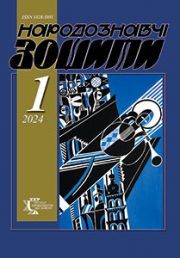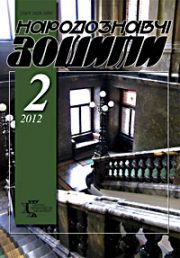The Ethnology Notebooks. 2020. # 6 (156), 1417—1426
УДК [398:303](478=161.2)
DOI https://doi.org/10.15407/nz2020.06.1417
Nadiia PASTUKH
- ORCID ID: https://orcid.org/0000-0001-7703-5541
- Candidate of Philological Sciences (Ph. D. in philology),
- Senior Researcher at the Ethnology Institute
- of National Academy of Sciences of Ukraine,
- 15, Svobody Avenue, 79000, Lviv, Ukraine,
- е-mail: npastukh@gmail.com
Olga KHARCHYSHYN
- ORCID ID: https://orcid.org/0000-0002-9379-8300
- Candidate of Philological Sciences (Ph. D. in philology),
- Senior Researcher at the Ethnology Institute
- of National Academy of Sciences of Ukraine,
- 15, Svobody Avenue, 79000, Lviv, Ukraine,
- е-mail: okharchyshyn@gmail.com
The article presents the analysis of the current state of the functioning of family ritual folklore in the Ukrainian villages of the Republic of Moldova. The research was conducted on the basis of the materials of folklore records that were carried out in 43 villages and 1 city of 10 districts of the Republic of Moldova (in places of compact residence of Ukrainians) during integrated scientific expeditions of the Institute of Ethnology of the National Academy of Sciences of Ukraine (2005—2007) and personal expeditions (2008—2009, 2016). The analysis also included a comparison of our fixations of folklore with available printed records of predecessors, which appeared in print from the 1870’s. XIX century. The relevance of the article is due to the lack of tangible interest from the Ukrainian ethnological and folklore science in the traditional ritual and folklore culture of Ukrainians in Moldova, and consequently in the absence of works that would present family folklore as a locally-regional integrity, ascertained by all-Ukrainian and local traits, traced the dynamics of changes in the genre system of folklore, in its repertoire, ritual context, and others like that. The object of the research is the texts of calendar ritual folklore (baptism (christening) songs, wedding songs, funeral songs, ritual crying), which are common in the Ukrainian villages of Moldova, and the subject is the modern state of the existence of such texts. The purpose of the article is to trace the state of preservation and functioning of traditional family ritual folklore, namely the dynamics of changes in the genre system, repertoire filling, ritual context, and peculiarities of execution. The research is based on the methodological foundations of locally-regional study of folklore, which were outlined in the writings of V. Hnatyuk, F. Kolessa, S. Myshanych, R. Kyrchiv and others.
Keywords: family ritual folklore, childbirth rituals, baptism (christening) ceremonies, weddings, funerals, Ukrainians of Moldova, baptism (christening) songs, wedding songs, funeral songs, ritual crying.
REFERENCES
- Kharchyshyn, O., Pastukh, N. & Koval, V.(2019). The current state of the functioning of the folklore tradition of Moldavian Ukrainians: calendar ritual folklore. The Ethnology Notebooks, 4 (148), 878—897 [in Ukrainian].
- Kharchyshyn, O. (2015). Some facts as for history of studies in Moldavian Ukrainians’ folklore (1870—1930). The Ethnology Notebooks, 2, 370—376 [in Ukrainian].
- Kharchyshyn, O. (2015). Research of Ukrainian-Moldovan ethno-cultural relations in Soviet folklore: modern reading. In Ukrainian-Moldovan ethnocultural relations. International symposium ad memoriam of the academician Konstantin Popovich (Vol. I, pp. 321—329). Chisinau [in Ukrainian].
- Kharchyshyn, O. (2012). Colyadkas of the Ukrainians of Moldova in the system of Ukrainian oral folk tradition.In Odessa Ethnographic Reading: Diaspora traditional culture. Collection of Scientific Works (Pp. 442—448). Odesa [in Ukrainian].
- Nesterovskii, P.A. (1905). Bessarabian Rusyns. Historical and ethnographic essay. Warsaw [in Russian].
- (1997). Our roots are in the land. The history, traditions and folklore of the villages of Danu, Kamenkuts and Nikolaevka of the Glodeni district. Research and materials.Chisinau [in Russian].
- Pastukh, N. (2010). Wedding ceremonial rites and accompanying songs of the Ukrainians in Northern Moldova. Mythology and Folklore, 2 (6), 26—36 [in Ukrainian].
- Kazimir, E. (1907). From the wedding and childbirth practices of the Khotyn district, Bessarabian province. Ethnographic Review, 1—2, 200—208 [in Russian].
- Popovych, Y.В. (1977). Materials about the Moldavian wedding at the periodical press of the 19th century. Folk Art and Ethnography, 4, 37—45 [in Ukrainian].
- Petrova, N. (2009). Wedding ceremonial rites of Prednister River Region’ Ukrainians (based on the materials of the research of Rybnitsa region). Carpathians: Man, Ethnic, Civilization, 1, 220—225 [in Ukrainian].
- Zelenchuk, V.S. (1959). Essays on Moldovan folk rituals (XIX, early XX centuries). Сhisinau: Kartya Moldoveniaske [in Russian].
- Jablonovs’kyj, V. (1905). Wedding in Otaky Village. In Kievan antiquities (Vol. 80, pp. 205—227). L’viv [in Ukrainian].
- [A. K.] (1897). Wedding songs, recorded in the Podol’ Province. Reprint from «Kievan antiquities» [in Russian].
- Romanchuk, A. (2017). The ethnolinguistic of observance of hen’s transferring over grave in the tradition of Bulaesty’s Ukrainians and its East Romanian and Slavic parallels: common and different. Philological Review, 1 (9), 62—74 [in Russian].
- Huzii, R. (2006). Funeral customs and rites. In Ethnogenesis and ethnic history of the population of the Ukrainian Carpathians (Vol. 2, pp. 569—589). L’viv [in Ukrainian].
- Svientsits’kyj, I. (Ed.). (1912). Funeral lamentation. In Ethnographic Collection (Vol. 31—32, pp. 1—129). L’viv [in Ukrainian].
- Pastukh, N. (2018). Pluvial practices in the Ukrainian villages of Ukrainian-Moldovan borderlands: the «Doll’s Funeral» Rite and Lamentation that Accompany it. The Ethnology Notebooks, 6 (144), 1456—1478 [in Ukrainian].
- Kolotylo, T. (2006). On the drought in the ethnic vision of the Podolians. Caregiver [Bereginya], 3 (50), 31—48 [in Ukrainian].
- Koval-Fuchylo, I. (Ed.). (2012). Lamentation. Kyiv [in Ukrainian].






